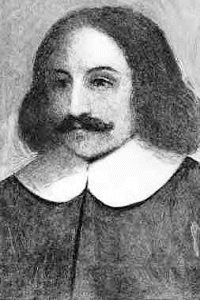BRADFORD, WILLIAM

(March, 1590, Austerfield, England-9 May 1657, Plymouth, MA). Education: Unknown. Career: Governor, Plymouth Colony, 1621-33, 1635, 1637, 1639-43, 1645-57.
Born into a yeoman family in 1590, William Bradford was raised by uncles after the early death of his father. At twelve years of age he became interested in the Bible, and at sixteen he joined the separatist congregation meeting at William Brewster's* house in Scrooby. In 1609 Bradford was one of the Puritans who followed Brewster into exile, living in Amsterdam, then Leyden, Holland. Bradford supported himself as an artisan and read widely in theology. He might well have died in obscurity, but for the next move by the Pilgrims, across the ocean to New England.
One of the survivors of the hard Plymouth winter of 1620-21, Bradford became governor of the fledgling Pilgrim colony in 1621 when the first governor, John Carver, died. During the remainder of his life Bradford was reelected governor thirty times. He contributed much substance to the mythical picture of the Pilgrims as decent, pious, hard-working men and women. He served many years as governor without salary, gave his own money to help pay the colony's debts, and died without haying amassed a personal fortune-as he might have done. A devout Puritan, he was nonetheless tolerant of other faiths and even entertained a Catholic priest in his home.
Fortunately, Bradford was also a writer, and he left a history of Plymouth, which many regard as the classic of colonial American literature. No one captured better than Bradford the simple piety and dedication of the Puritans in a new world: "Being thus arrived in a good harbor and brought safe to land, they fell upon their knees and blessed the God of heaven, who had brought them over the vast and furious ocean, and delivered them from all the perils and miseries thereof, again to set their feet on the firm and stable earth, their proper element."
Bibliography
A: Letter-book fragment, Massachusetts Historical Society Collections, ser. 1, vol. 3, 27-84; A History of Plymouth Plantation, Samuel Eliot Morison, ed. (New York, 1952).
B: DAB 2, 559-63; DARB, 60-61; NCAB 7, 368-69; James Shepard, Governor William Bradford (New Britain, Conn., 1900); Albert H. Plumb, William Bradford of Plymouth (Boston, 1920); Bradford Smith, Bradford of Plymouth (Philadelphia, 1951).
Born into a yeoman family in 1590, William Bradford was raised by uncles after the early death of his father. At twelve years of age he became interested in the Bible, and at sixteen he joined the separatist congregation meeting at William Brewster's* house in Scrooby. In 1609 Bradford was one of the Puritans who followed Brewster into exile, living in Amsterdam, then Leyden, Holland. Bradford supported himself as an artisan and read widely in theology. He might well have died in obscurity, but for the next move by the Pilgrims, across the ocean to New England.
One of the survivors of the hard Plymouth winter of 1620-21, Bradford became governor of the fledgling Pilgrim colony in 1621 when the first governor, John Carver, died. During the remainder of his life Bradford was reelected governor thirty times. He contributed much substance to the mythical picture of the Pilgrims as decent, pious, hard-working men and women. He served many years as governor without salary, gave his own money to help pay the colony's debts, and died without haying amassed a personal fortune-as he might have done. A devout Puritan, he was nonetheless tolerant of other faiths and even entertained a Catholic priest in his home.
Fortunately, Bradford was also a writer, and he left a history of Plymouth, which many regard as the classic of colonial American literature. No one captured better than Bradford the simple piety and dedication of the Puritans in a new world: "Being thus arrived in a good harbor and brought safe to land, they fell upon their knees and blessed the God of heaven, who had brought them over the vast and furious ocean, and delivered them from all the perils and miseries thereof, again to set their feet on the firm and stable earth, their proper element."
Bibliography
A: Letter-book fragment, Massachusetts Historical Society Collections, ser. 1, vol. 3, 27-84; A History of Plymouth Plantation, Samuel Eliot Morison, ed. (New York, 1952).
B: DAB 2, 559-63; DARB, 60-61; NCAB 7, 368-69; James Shepard, Governor William Bradford (New Britain, Conn., 1900); Albert H. Plumb, William Bradford of Plymouth (Boston, 1920); Bradford Smith, Bradford of Plymouth (Philadelphia, 1951).
